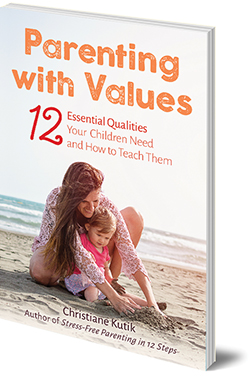Parenting with Values: 12 Essential Qualities Children Need and How to Teach Them
by Floris Books • 24 April 2018 • Extract, Parenting • 0 Comments
.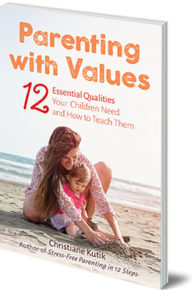 What do we, as parents, need to give our children to ensure they grow up to be happy, well-balanced and resilient people? Parenting tutor and mother of two Christiane Kutik tells us that, above all, children need their parents to give them strong values to help them find their way in life. In this extract from her latest book, Parenting with Values, Kutik explains why she feels this approach can be beneficial to both you and your children.
What do we, as parents, need to give our children to ensure they grow up to be happy, well-balanced and resilient people? Parenting tutor and mother of two Christiane Kutik tells us that, above all, children need their parents to give them strong values to help them find their way in life. In this extract from her latest book, Parenting with Values, Kutik explains why she feels this approach can be beneficial to both you and your children.
Helping the Heart to Grow
A six-year-old boy sitting next to his father suddenly asks him out of the blue, ‘There are more good people than bad people, aren’t there, Dad? ’
His father looks thoughtful for a moment, then replies warmly, ‘Yes, there are. And do you know, every day moments come when you and I can make life better! ’
In current-day parenting, we can find ourselves focusing on behaviours we want or don’t want from our children, and skills we think they need to develop. Considering ‘values’ might seem a little out of step with the modern world. Yet family life and our relationships with children are necessarily heavily laden with our values, for good or ill. As parents and caregivers, we are always demonstrating ways of being in the world with others and within ourselves. We are helping children to grow as emotional and moral beings. So I would encourage thinking about what might seem an old-fashioned idea: the development of character. Our children’s wellbeing is dependent on the growth and learning not just of body and mind, but also of the heart.
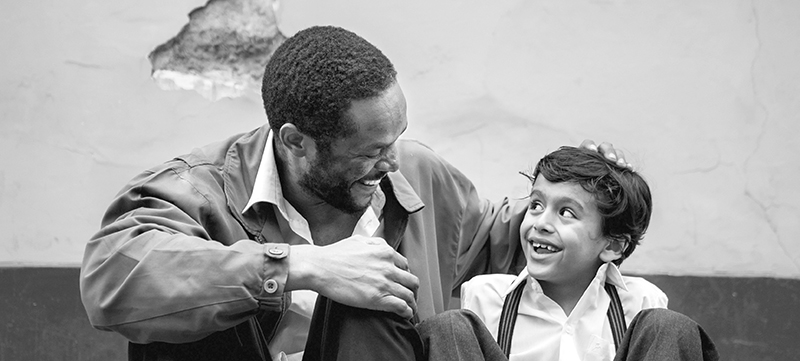 We can all take small actions every day to make life kinder and richer, starting with considering how we ourselves behave towards, and how we communicate with, our children. Commands like, ‘Don’t tell lies!’, ‘Eat nicely!’ and ‘Don’t swear!’ are certainly direct, but they are usually less effective than modelling good behaviour for children ourselves. We can make sure we speak truthfully. We can show our good manners. We can make sure we don’t swear.
We can all take small actions every day to make life kinder and richer, starting with considering how we ourselves behave towards, and how we communicate with, our children. Commands like, ‘Don’t tell lies!’, ‘Eat nicely!’ and ‘Don’t swear!’ are certainly direct, but they are usually less effective than modelling good behaviour for children ourselves. We can make sure we speak truthfully. We can show our good manners. We can make sure we don’t swear.
We can all try to take more care. None of us is perfect, but we can take notice of our own faults and try to remedy them. This is an important example to set for children: that character, and our hearts, can develop if we take care of them. It might be uncomfortable to witness our children reflecting our flaws back at us, but we can certainly learn from the experience. As Goethe said, ‘A growing person will always be grateful.’ Remember, as parents we are still growing too, and we learn a great deal when we closely observe the natural, warm-hearted impulses children bring with them into the world.
Heart to heart
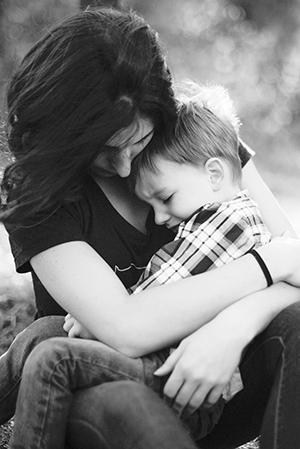 Take a moment to notice how much little children love sharing. All infants, to begin with, have this wonderful quality. But we adults can often unintentionally hinder it. Does this scene sound familiar?
Take a moment to notice how much little children love sharing. All infants, to begin with, have this wonderful quality. But we adults can often unintentionally hinder it. Does this scene sound familiar?
A father hands his daughter a piece of apple. The little girl takes it, bites off a piece, then offers the rest back to her father so he can have a bite too.
But rather than sharing, he is frustrated. ‘No,’ he says. ‘Eat up! ’
It is natural to want our children to be nourished and to eat the food we give them; indeed, in every way, we want them to have what they need. Giving our children things that are ‘just for you’ might seem like the best way to parent – and the best way to please them. But what we see as generosity and nurturing can suppress children’s natural warmth of heart.
The little girl who wanted her father to have a piece of apple might keep trying for a while to offer things she has, but if she is only ever rebuffed eventually she will assume her gifts are not wanted and she will stop. Yet children long to be taken seriously by grown-ups. How much better would it be to accept the gift given with such generosity of spirit and to encourage this impulse in our children?
Smiling is infectious
Children reflect genuine, vivid joyfulness when we really see them, when they sense our warm smile, for no particular reason, shining upon them. Smiling makes an immediate connection between people and warms our hearts – and that’s what the world needs. Smiling is infectious: when we give, it comes straight back.
A smile is enough
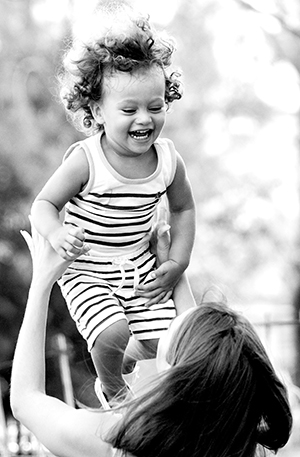 Over one hundred studies have shown that rewarding children’s values by giving them material things will ‘weaken internal motivation’. One of these studies, with two groups of infants aged twenty months, involved the adult participant clearing her desk and dropping a pencil. In the first group, the children who picked it up and gave it back to her were each given a small reward, while in the second they received a friendly smile. The researchers found that children rewarded materially soon lost the spontaneous urge to help, the children who received a smile did not. The smile affirmed the relationship the children were trying to build.
Over one hundred studies have shown that rewarding children’s values by giving them material things will ‘weaken internal motivation’. One of these studies, with two groups of infants aged twenty months, involved the adult participant clearing her desk and dropping a pencil. In the first group, the children who picked it up and gave it back to her were each given a small reward, while in the second they received a friendly smile. The researchers found that children rewarded materially soon lost the spontaneous urge to help, the children who received a smile did not. The smile affirmed the relationship the children were trying to build.
Nowadays, there are so many toys and technologies that can give children fleeting pleasure, and it is natural for us to want our children to have whatever they desire. However, the risks of using these as rewards for natural impulses should be heeded. Let’s cherish our children’s innate capacity for generosity and loving assistance, rather than feeling we need to reward them for it with more than love and smiles.
A warm greeting
Every encounter with our children has the potential for joy. This is why greeting them first thing in the morning is so important. Share a hug and say their name. Showing that we are happy to see our children gets the day started on a hopeful footing, and it only takes a couple of seconds. The same is true of giving a warm farewell when it is time to go to school or to nursery. These small gestures strengthen our children emotionally and make them feel loved.
Building emotional resilience
Helping our children to grow morally and emotionally is integral to our role as parents. However much we might wish otherwise, there are many negative influences around them. We might not be able to change the world, but we can help our children to build emotional resilience and give them the tools they need to thrive. As parents, we can stand up for our values and beliefs. We can show our children what good, caring behaviour looks like and watch them bring those qualities into their own lives. This will bequeath our children a firm place in the world and comfort in their own being. Have courage: parenting with values will strengthen you and your child immeasurably.
About Parenting with Values
Many of us consider values to be an old-fashioned concept. But Kutik suggests that by fostering twelve vital values, parents can provide their children with all the tools they need to flourish, to discover the worth of non-material rewards and to have an emotionally enriching life.
Parenting with Values encourages parents to reflect on which values they want to pass on to their children. In twelve short, easy-to-digest chapters, Kutik discusses the essential qualities that children need, and explains how each one is learned and passed on from parent to child.
The twelve essential values Kutik identifies are:
- Self-esteem
- Compassion
- Honesty
- Respect
- Sensibility
- Humour
- Security
- Capacity to manage conflict
- Independence
- Interest in the world
- Soulfulness
- Connection the natural world
This engaging and readable book is filled with practical everyday examples of values in action. It will provide inspiration for parents who wish to proactively encourage positive development in their children.
‘This is a brilliant book… [Parenting with Values] provides us with the opportunity to reflect and consider how to free ourselves from some of the stresses of parenting by renewing these twelve qualities within ourselves and modelling them for our children.’
– New View
‘These are short, easy to digest chapters filled with everyday examples of values in action. Inspiring!’
– Kindling
‘Short enough to be an easy read, but powerful enough to give you an insight into ways that you might be able to help when it comes to essential values.’
– EYE Magazine
